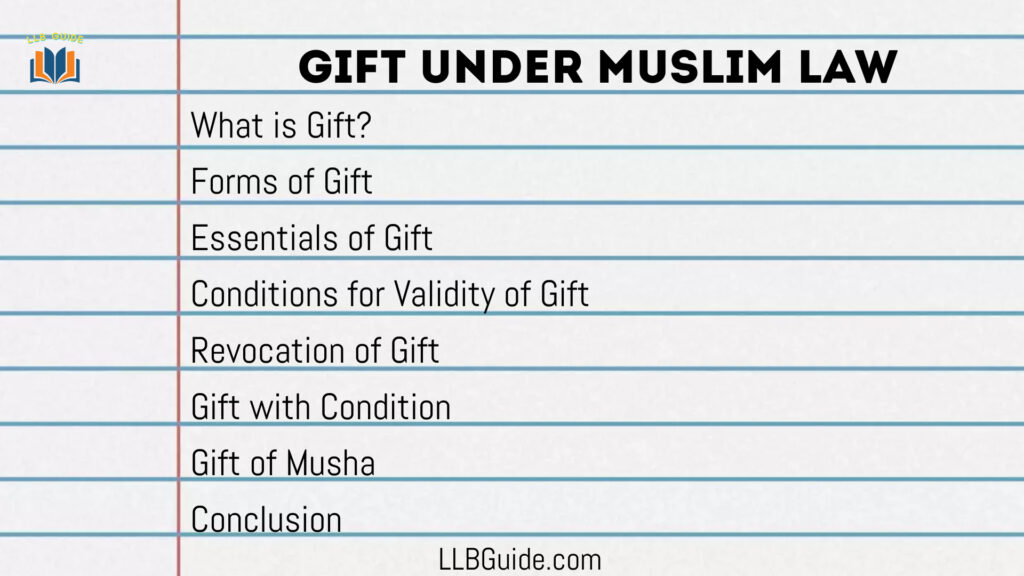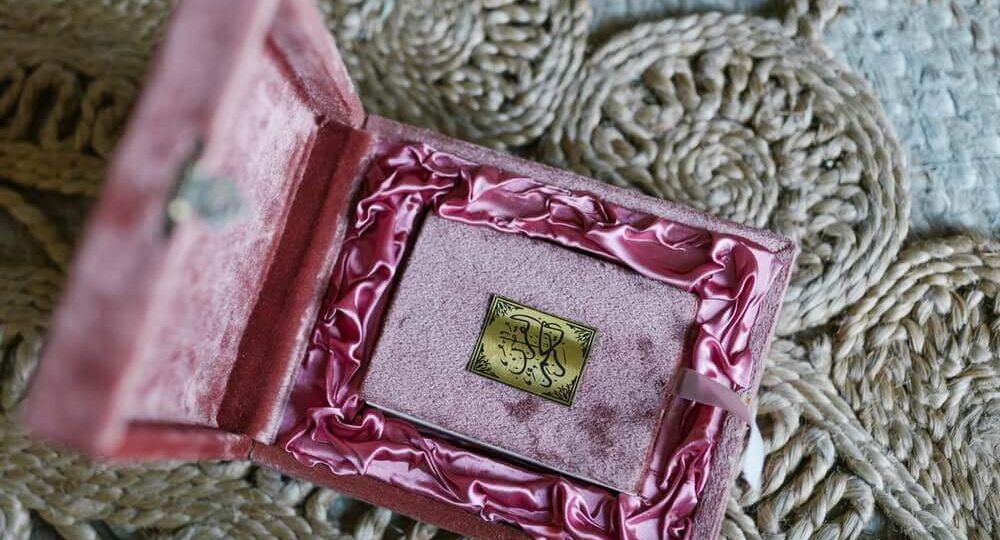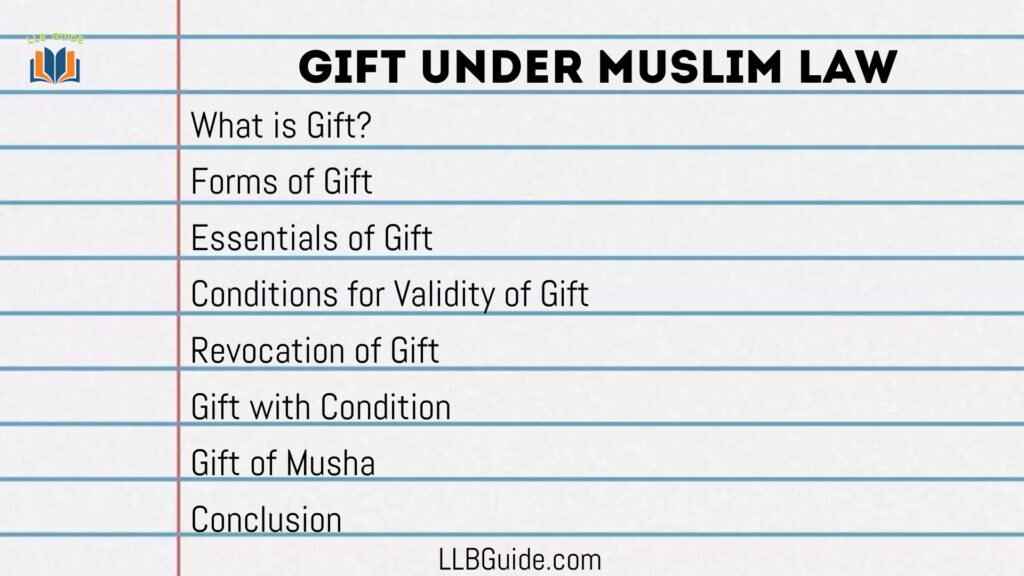Gift under Muslim Law is also known as Hiba, hiba meaning in Islam is the transfer of any right or property movable or immovable with free consent and without its consideration, by one person (who shall be Muslim) called the donor to the other person called the donee. Delivery of possession is a must in a gift. Such gift can be revoked before or after the delivery of possession, on the will of the donor. The whole concept of Hiba in Islam is explained in detail and also gift under Muslim law notes.

Table of Contents
What is a Gift Under Muslim Law?
Gift under Muslim Law is also known as Hiba. It refers to a voluntary transaction made by the donor to the donee, transferring the possession of certain movable or immovable property without consideration. It can be revoked under different circumstances which are described later in this article.

Meaning of Gift
A gift literally means something acquired without compensation.
Definition of Gift
Definition of Gift Under Islamic Law:
Gift or Hiba is an immediate transfer of property, a right, by one person to another without consideration.
Definition of Gift Under Transfer of Property Act 1882:
Under section 122: A gift is a transfer of certain existing movable or immovable property made voluntarily and without consideration by one person called the donor to another person called the donee and excepted on the behalf of donee.
Forms of Gift In Islamic Law
These are the forms of Gift in Islamic Law:
1. Aariat
An Aariat is a giving of use, enjoyment, or usufruct of property or right by one person to another without consideration.
According to Fatwa e Alamgiri: It is the giving of usufruct or use so with a person.
2. Sadqa
A Sadqa is an immediate transfer of property or right by one person to another with the object of acquiring some spiritual benefits without consideration. Sadqa is irrevocable.
3. Hiba Bil-iwaz
A Hiba bil-iwaz is a transfer of property or right in return for something. When the gift is made and in consideration of the gift something is given to the donor by the donee, such gift is called Hiba and such consideration is called iwaz. Iwaz can not be equal to the actual value of the gift.
4. Hiba By Shart-ul-iwaz
Hiba By Shart-ul-iwaz is also a transfer of property or right in return for something which is called iwaz. Iwaz in this form of gift is not immediately paid but postponed for future payment.
Essentials of Gift
Following are the essentials of Hiba:
1. Offer by Donor
There must be an offer by the donor.
2. Acceptance by Donee
There must be acceptance of such an offer by the donee or on behalf of the donee.
3. Delivery of Possession
Immediate delivery of possession is necessary.
4. Transfer of Ownership
Transfer of ownership is another essential of hiba.
5. Without Consideration
Hiba is always without consideration.
6. Existence of Donor
The donor must be in existence (alive).
7. Existence of Donee
If there is no donee there will be no gift. There can be one or more than one donee.
8. Free Consent
A gift must be voluntarily made by the donor.
9. Existence of Property
The gifted property movable or immovable must be in existence at the time of the making of the gift. Imaginary property can not be gifted.
10. Competency of Donor
The donor must be:
- Muslim
- Sound Mind
- Major
- Owner of such property.
11. Lawful Gift
The gift must be lawful. The subject matter of the gift should not be permitted by the law.
12. Competency of Donee
The donee can be:
- Muslim or non-Muslim
- Minor or major
- Sound or unsound mind
- unborn child (he also gets Inheritance)
Conditions of Validity of Gift
The following are the conditions that confirm the validity of the gift when they are met:
1. Declaration
Declaration refers to the offer which is made by the donor, it can be spoken or written. The offer must be emphatic and explicit showing the willingness of the donor to make such a gift. Any declaration made without the free consent of the donor makes the gift void.
2. Acceptance
A gift made by the donor is invalid until it is accepted by the donee. In case the donee is unable to make a contract, the acceptance can be made on behalf of such donee by his guardian. If there is more than one donee, acceptance should be made by them separately.
3. Delivery of Possession
The gift becomes valid after the delivery of possession. Transfer of immediate possession of gifted property to the donee is a must.
Revocation of Gift
Gift under Islamic Law can be revoked by the donor. The donor has a right to cancel his proposal even if the gift fulfilled all other essentials. There are also some circumstances where the gift can not be revoked. Both the scenarios are explained below:
When Gift be Revoked?
Gift or Hiba under Muslim Law can be revoked:
1. Before delivery of Possession
The gift is a voluntary transaction it can be revoked at any time until the possession of the gifted property is delivered to the donee by the donor.
2. After Delivery of Possession
In case the delivery of gifted property is transferred to the donee, the gift can still be revoked by the following means:
- Mutual Consent: Both parties agree to cancel the transaction.
- Decree of the Court: The donor can file a suit in the Court for the revocation of such gift.
When Gift can not be Revoked?
There are some circumstances in which the gift can not be revoked, which include:
- Where the donee has died.
- Where the donor has died.
- When a gift was made between spouses of a Valid marriage.
- When the purpose of the gift is Sadqa.
- When the subject matter of the gift has been destroyed.
Gift With Condition
Under Hanafi Law
A gift of the corpus of any property made with a condition is valid but the condition is void.
Under Shia Law
If the condition attached to the gift is subsidiary then both the gift and condition are valid.
Future Gift
A gift of the corpus of any property which is to take effect at any time in the future is void.
Contingent Gift
A gift of the corpus of any property subject to the happening of some contingency is also void.
Gift of Musha
Musha under Islamic Law refers to ‘undivided property’. If any property is owned by two or more two owners, and one of them gifts his share of such property to any other person, there will be confusion about which part is actually gifted. Under Hanafi Law Musha is not giftable, first divide it then gift it. Under Shafi Law gift of Musha is valid.
Conclusion
Meaning of hiba or gift in Muslim law means the transfer of any right or property movable or immovable with free consent and without its consideration, by one person (who shall be Muslim), the donor to the other person, the donee. Delivery of possession is a must in a gift. Such gift can be revoked before or after the delivery of possession, on the will of the donor.
FAQs
What is the concept of gift in Islam?
Gift/Hiba is the transfer of right or property with free consent and without its consideration, by one person, donor to the other person, the donee.
What is the difference between will and gift in Islam?
In Islam, a Person(Muslim) can gift his all property to anyone but make a will of only one-third of his property.
What are the kinds of gifts under Muslim law?
Aariat, Sadqa, Hiba Bil-iwaz, and Hiba By Shart-ul-iwaz.
Are conditional gifts under Muslim law allowed?
Under Hanafi Law it is Void, under Shia Law it is valid.
What is the concept of gift in Islam?
Gift or Hiba in Islam is a transfer of a right or property with free consent and without its consideration.

